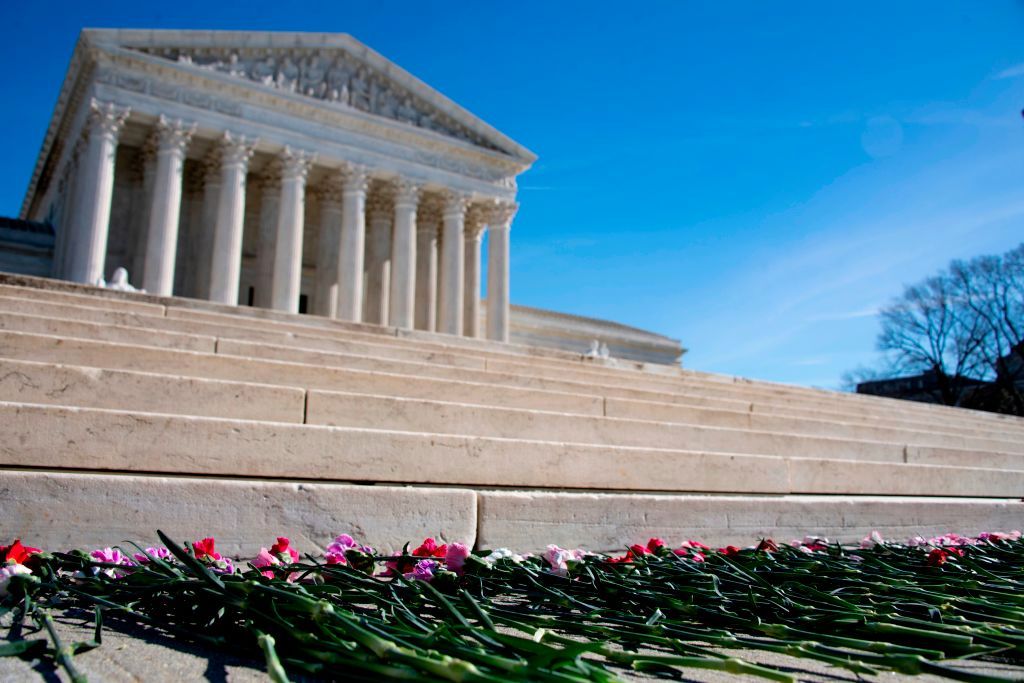The Fight For Abortion Rights: How Supreme Court Review Of Mississippi Case Threatens Roe v. Wade
Source: JIM WATSON / Getty
The U.S. Supreme Court announced Monday it would hear a controversial Mississippi abortion case leaving many to wonder if the Court would undo Roe v. Wade. As the experts over at the Boom! Lawyered podcast explained, Dobbs v. Jackson Women’s Health Organization involves a law that banned abortions beginning at 15 weeks.
And while the Supreme Court’s conservative majority does not give much hope for the outcome of this case, surprises have been known to happen. The concern for abortion advocates, providers and impacted communities is real.
But people are not holding their breath as the Court gears up to hear the current challenge. Here are five facts about the fight for abortion rights and what’s at stake in Dobbs.
Abortion remains legal in all 50 states.
First and foremost, abortion continues to be legal in all 50 states. While various measures and restrictions have limited access to abortion, the right remains intact.
At issue in Dobbs is the constitutionality of pre-viability bans. These are bans that prevent abortion in most, if not all, situations before a fetus being medically viable outside of the womb.
Previously struck down by the conservative Fifth Circuit Court of Appeals as unconstitutional, the Mississippi abortion ban would undo existing precedent. “By taking this case, the court will be reviewing nearly 50 years of precedent guaranteeing our right to abortion,” said Planned Parenthood Action Fund President Alexis McGill Johnson in a statement.
States like Mississippi already make abortion access difficult
Among a handful of states with only one abortion clinic, Mississippi continues to press people to the margins. The Center for Reproductive Rights and the Mississippi Center for Justice challenged Mississippi’s 15-week ban on behalf of the Jackson Women’s Health Organization.
Responding to the Supreme Court’s announcement Diane Derzis, owner of Jackson Women’s Health Organization, said in a statement that the strategy was to eliminate abortion access.
“We see patients who have spent weeks saving up the money to travel here and pay for childcare, for a place to stay, and everything else involved,” Derzis explained. “If this ban were to take effect, we would be forced to turn many of those patients away, and they would lose their right to abortion in this state.”
Pre-viability abortion bans have been consistently held unconstitutional.
Abortion bans before viability, such as the one passed by Mississippi, have been consistently held unconstitutional. Yet conservative lawmakers continue to spend more time and resources trying to gut legal protections and established rights than ensuring people have access to their basic needs.
“For over a decade, we have seen a group of well-funded anti-abortion state legislators introduce and pass strategic policies that chip away at abortion access,” said Jennifer Driver, senior director of reproductive rights for the State Innovation Exchange. Driver pointed to laws in 11 states that trigger an abortion ban if Roe is overturned. Over 20 states have laws that forbid abortion outright in the event federal law changes.
An interactive map from the Center for Reproductive Rights gives several examples about what could happen in each state if the Court strikes down Roe.
Abortion funds stay ready.
Abortion bans and other restrictions are rarely about genuine concerns for health and physical well-being. But abortion funds across the south stay ready. Mississippi native and Yellowhammer Fund’s Executive Director Laurie Bertram Roberts called out the increasingly partisan nature of the Court.
“Gearing up an abortion case that could overturn Roe v. Wade to conclude just before midterms is as blatant as you can be,” said Roberts in a statement. Pointing to the many injustices Black southerners have overcome, Roberts said the possible end of Roe isn’t the worst that could happen to their community.
“We will always find a way because that is what we do,” Roberts continued. “And Yellowhammer Fund will always be there to make that path easier in any way possible. No matter what the Supreme Court decides in the summer of 2022 regarding Roe, abortion will always remain a human right.”
Before stepping into the lead role at the Yellowhammer Fund, Roberts ran the Mississippi Reproductive Freedom Fund, a reproductive justice organization and abortion fund committed to providing all people with full reproductive health care.
But advocates like Roberts are clear that Roe is the floor. Communities are working at the intersection of maintaining basic rights while advocating for Medicaid expansion, ending the Hyde Amendment, and ensuring equity and justice for all.
The courts alone will not save us.
Even if the Court does not overrule Roe outright, it’s only delaying the inevitable unless concerted efforts are taken at levels of government to ensure abortion access for all who need it. The work of abortion funds and organizers expanding the realm of reproductive advocacy beyond abortion to a broader understanding of justice are critical to ensuring people’s needs are met.
As with any threat to rights and liberties, people can take steps to protect themselves and those around them. A student of history and politics, advocate, and writer Robin Marty has laid out the course to take in a Post-Roe America.
In her new book, “New Handbook for Post-Roe America,” Marty lays out the possible outcomes for reducing legal abortion access. But she also provides a framework for action regardless of what the Court decides next year.
The handbook provides a contextual overview of the current state of abortion rights, including a listing of state restrictions and contingencies in the event Roe is overturned. Suggestions range from tips on emergency contraception to how to get involved in organizing.
SEE ALSO:
Black Women On Roe v. Wade: ‘Now’s The Time To Ensure Equity, Not Just Access’
[ione_media_gallery id=”4155424″ overlay=”true”]

